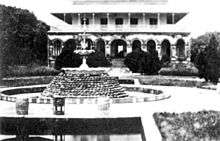All India Muhammadan Educational Conference

The All India Muhammadan Educational Conference was an organisation promoting modern, liberal education for the Muslim community in India. It was founded by Syed Ahmed Khan, also the founder of the Aligarh Muslim University.[1] The conference was an all-India body that constituted a major part of the Aligarh Movement. With the view of promoting the educational cause of 70 million Indian Muslims, Sir Syed founded, in 1886, the Muhammadan Educational Conference, which held its meeting at various places to provide a forum for discussing problems that affected the Muslims at large.[2] All India Mumammadan Educational Conference was the origin of the All-India Muslim League. The Muslim League was born in the 20th session of All India Muhammadan Educational Conference, which was established by Syed Ahmed Khan in Aligarh in 1886.[3] Muhammadan Educational Conference used to hold its annual meetings in various cities where, by the co-operation of local Muslims, steps were taken for the progress of education.
Aims
The principal aims of the Conference were:
- To make an effort to spread among the Muslims western education to the higher standard.'
- To enquire into the state of religious education in English schools founded and endowed by the Muslims, and to find out means to conduct it in the best possible way.
- To give some strengthened support to the instruction voluntarily imparted by Muslim divines in religious and other oriental learning's and adopt some measures to maintain it as a living concern.
- To examine a state of education and instruction in the indigenous primary schools and take steps to remove their present state of decay in directing them onto the path of progress.
The 1906 conference

After the Congress sponsored agitation against the partition of Bengal (1905) an All India Muhammadan Educational Conference was held at Shahbag in Dhaka, capital of the then East Bengal and Assam Province in the year 1906.[4] The conference was sponsored by Nawab Khwaja Salimullah the Nawab of Dhaka. The conference was inaugurated on 27 December 1906 and continued till 29 December 1906 as Conference on Education. The inaugural session was chaired by Nawab Justice Sharfuddin, the newly appointed justice of Calcutta High Court.
On 30 December 1906 political session of the conference took place. It was chaired by Nawab Viqar-ul-Mulk. In this session a motion to form an All India Muslim League (AIML) was proceeded. Initially a party styled as All India Muslim Confederacy was discussed. But, in the process the name All India Muslim League, proposed by Nawab Khawaja Sir Salimullah Bahadur and seconded by Hakim Ajmal Khan, was resolved in the meeting. All delegates were registered as members of the proposed party led by Janab Muhsin-ul-mulk and Janab Wakar-ul-mulk was Joint Conveners.
AIML was first Muslim political party in the history of India. From the even date Muslims of all Indian provinces were under the mainstream political umbrella of Muslim League until independence achieved in the year 1947 under the leadership of Muslim League. Awami Muslim League and Awami League was also formed as a late production of the party in the Pakistan Period. In Indo pak Bangla sub continent those parties have the part League possess heritage of Muslim League till date. Political awareness, eagerness and rising of Muslims was organised and institutionalised from the starting point of establishing All India Muslim League.
Venue

It is to be noted that the place where All India Muhammadan Educational Conference were held was known to all as Ishrat Manzil, a mansion of the Dhaka Nawab Family that was later donated for the establishment of the Dhaka University. After 5 years of this conference in the year 1911 Partition of Bengal was annulled in the Delhi Durbar. In the year 1912 A delegation headed by Khawaja Nawab Sir Salimulla met Lord Hardinge Lt. Governor, to the same venue demanding establishment of a University at Dacca and it was agreed. Upon whom present Dhaka University was started its functioning on 1 July 1921 in the same venue. Now the Eshrat Manzil lapsed its heritage, fame and name of Dhaka's Nawab family and prevailed as a canteen named Madhur Canteen.
Delegates
A total of 1955 delegates attended the event. The conference was attended by most of the Muslim zamindars, educationists, pleaders, and other leaders of the community. The programme was attended among others by:
- Nawab Muhsinul Mulk Bahadur
- Mamtajul Mulk Khalifa Syed Muhammad Hussain of Patiala
- Hakim Muhammad Azmal Khan of Delhi
- Khan Bahadur Raja Sir Mohammad Ali Mohammad Khan of Mahmudabad
- H.M. Malek of Nagpur
- Khan Bahadur Ahmad Muhiuddin of Madras
- Khan Bahadur Sheikh Gulam Sadik of Amritsar
- Raja Nawshad Ali Khan, Talukder of Audh
- Nabiullah, Bar at law, Lucknow
- Syed Zahur Ahmad, lawyer, Lucknow
- Honourable Khan Bahadur Nabab Syed Nawab Ali Chowdhury, Zaminder of Mymensingh
- Khan Bahadur Ali Nawab Chowdhury, Zaminder, Comilla
- Abdul Majid, District Session Judge, Assam
- Abdul Karim, School Inspector, Chittagong Division
- Khan Bahadur Moulvi Syed Muhammad, Inspector General of Registration, Bengal
- Mr. Sharp, Director of Public Instructions, East Bengal
- H.P. Mosurior, CIE, Commissioner, Dacca
- B.C. Allen, Magistrate and Collector, Dacca
- Stapleton
- Mr. Kelp, editor, Bengal Times
- Colonel J Hodinge, CIE
- Campbell
- Rafiuddin Ahmed, Bar-at-law, of Bombay
- Nizamuddin Ahmed, B.A.B.L.Deputy Commissioner, Berar
References
- ↑ "All-India Muhammadan Educational Conference". global.britannica.com. Encyclopædia Britannica. Retrieved 12 July 2015.
- ↑ "Muhammadan Educational Conference: It’s [sic] Impact on the Development of Modern Education for Muslim Community in Rajasthan During 20th Century" (PDF). Retrieved 11 September 2016.
- ↑ Jones, Justin (24 October 2011). Shi'a Islam in Colonial India: Religion, Community and Sectarianism. Cambridge University Press. ISBN 9781139501231.
- ↑ Khan, Zaigham. "Pakistan of the Ismailis". thenews.com.pk. The News International. Retrieved 12 July 2015.
